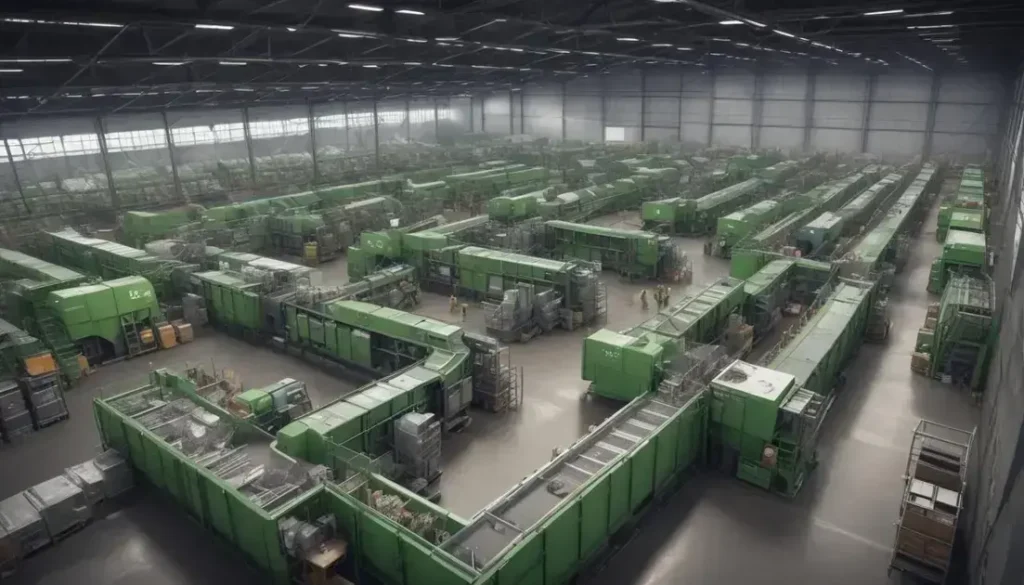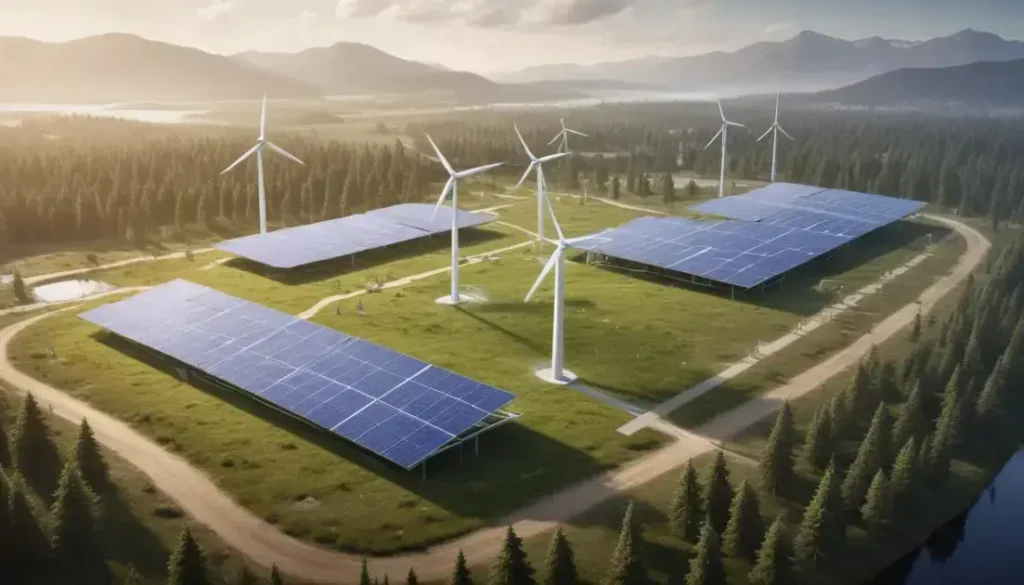The Australian recycling market is set for growth, driven by advancements in technology, strong legislative support, and an increasing focus on sustainable practices within industries and communities.
In recent times, investment in recycling infrastructure has gained momentum, especially in Australia, highlighting trends and innovations that can transform industries.
Global efforts in recycling infrastructure enhancement
Global efforts in recycling infrastructure enhancement are crucial for promoting sustainability and reducing waste. By investing in modern recycling facilities, countries aim to improve their efficiency and capacity to process materials. These advancements enable better segregation of recyclables, ensuring that more resources are diverted from landfills.
Technological Innovations: Many regions are adopting new technologies to enhance recycling processes. For instance, advanced sorting systems use artificial intelligence to identify and separate materials more effectively. This innovation helps increase recycling rates and reduces contamination, leading to higher-quality recycled products.
Furthermore, initiatives to develop infrastructure, such as collection centres and processing plants, are essential. These facilities not only create jobs but also foster local economies by supplying materials for manufacturing. Properly designed recycling systems can significantly contribute to a circular economy, where resources are reused and recycled continually.
Collaboration among governments, businesses, and communities is vital in these efforts. Public awareness campaigns play a significant role in educating citizens about recycling best practices and encouraging participation. As each stakeholder works together, the vision of a sustainable future becomes more achievable.
Impact of circular economy on recycling facilities
The impact of the circular economy on recycling facilities is significant, promoting sustainable practices that prioritise resource regeneration. By adopting circular economy principles, recycling operations are reimagined to not only reclaim materials but also reduce the overall consumption of resources.
Modern recycling facilities are evolving to accommodate these principles, implementing processes that enhance efficiency and effectiveness. With a focus on reusing materials, these facilities are designed to minimise waste and maximise the recovery of valuable resources. This shift creates a more resilient supply chain and reduces dependency on virgin materials.
Technological advancements also play a crucial role in this transformation. Innovations, such as automated sorting systems and advanced processing techniques, ensure that recycled materials meet the quality requirements for various industries. This capability bolsters the circular economy by facilitating the use of recycled materials in manufacturing.
Furthermore, education and community involvement are essential in maximising the effectiveness of recycling facilities. Public awareness campaigns encourage participation in recycling programs, driving demand for recycled products. As communities embrace circular economy practices, the collaboration between recycling facilities and local stakeholders strengthens the overall impact, paving the way for a more sustainable future.
Examples of successful recycling initiatives
Successful recycling initiatives worldwide serve as inspiring examples of how communities can effectively manage waste and promote sustainability. One notable example is Sweden’s recycling program, which boasts a recycling rate of over 99%. This remarkable accomplishment is due to a well-structured system that includes extensive public education and efficient waste collection methods.
Additionally, Germany’s Green Dot system has transformed the country’s approach to packaging waste. By implementing a licensing system for producers, Germany incentivises companies to create recyclable packaging, resulting in significant reductions in landfill waste. This initiative has not only boosted recycling rates but also generated awareness about sustainable packaging among consumers.
In Australia, council-led initiatives have also made significant strides. For instance, the ‘Return and Earn’ scheme encourages individuals to recycle drink containers by offering financial rewards. This approach has led to increased participation in recycling programs, generating a positive impact on local communities and the environment.
Such initiatives highlight the importance of strong community involvement and innovative strategies in achieving recycling success. By sharing their experiences, these examples can inspire other regions to develop effective recycling systems and foster a culture of sustainability.
The role of technology in modern recycling
The role of technology in modern recycling is pivotal, revolutionising how materials are collected, sorted, and processed. Advanced technologies are streamlining operations and increasing the efficiency of recycling facilities worldwide. For instance, automated sorting systems utilise artificial intelligence and machine learning to identify and separate different types of materials. This innovation drastically reduces human error and increases the overall recovery rate of recyclables.
Moreover, technology enhances data tracking throughout the recycling process. By implementing smart sensors and IoT (Internet of Things) devices, recycling companies can monitor waste streams in real time. This capability allows for better decision-making regarding resource allocation and operational adjustments, facilitating a more reactive approach to recycling challenges.
Mobile applications are also becoming increasingly popular, providing consumers and businesses with information on local recycling options and guidelines. These apps promote engagement and help individuals understand how to properly recycle materials, further increasing recycling rates.
In addition, innovative processing technologies improve the quality of recycled materials. Techniques such as chemical recycling break down plastics into their basic components, allowing for new products to be created. As technology continues to advance, its integration into the recycling industry will be crucial for achieving sustainability goals and reducing waste.
Economic benefits of recycling for Australian industries
The economic benefits of recycling for Australian industries are substantial, contributing to job creation and resource conservation. Recycling not only reduces the environmental impact but also fosters a more sustainable economy by turning waste into valuable resources. For instance, reclaimed materials can be used in manufacturing, significantly lowering production costs.
Australian industries see numerous gains through recycling initiatives. The construction sector benefits greatly from using recycled materials, such as crushed concrete and reclaimed timber, to build new structures. This practice not only decreases the reliance on virgin materials but also reduces landfill costs.
Moreover, recycling creates jobs across various sectors, from collection and processing to manufacturing. As recycling efforts expand, so does the workforce, providing new opportunities in local communities. This boost in employment contributes to greater economic stability and growth.
The implementation of recycling programs also enhances the competitiveness of Australian businesses. By adopting sustainable practices, companies can attract environmentally conscious consumers and gain an edge in the market. Additionally, government incentives for recycling can further motivate industries to invest in sustainable solutions, promoting economic resilience.
Insights into Belgium’s recycling advancements
Belgium has emerged as a leader in recycling advancements, showcasing innovative practices that other nations can emulate. The country has achieved impressive recycling rates, largely due to its systematic approach and strong public engagement. One key factor is the implementation of the Extended Producer Responsibility (EPR) scheme, which places the onus on manufacturers to manage the lifecycle of their products.
This initiative has incentivised producers to create packaging that is more easily recyclable, thus reducing waste. Moreover, Belgium’s commitment to sorting waste at the source has dramatically increased the quality of recyclables. Households are educated on proper waste separation, ensuring that materials like plastics, metals, and glass are correctly sorted.
Technological innovations have also played a vital role in enhancing Belgium’s recycling capabilities. The use of smart bins equipped with sensors helps monitor waste levels in real time, optimising collection routes and reducing operational costs. Additionally, local governments encourage initiatives that promote community involvement, such as recycling competitions and educational workshops, fostering a culture of sustainability.
Overall, Belgium’s comprehensive approach to recycling not only benefits the environment but also serves as a robust model for nations striving to enhance their recycling systems. By focusing on producer responsibility, public education, and the adoption of smart technologies, Belgium sets a high standard for recycling practices worldwide.
The importance of sustainable practices
The importance of sustainable practices cannot be overstated in today’s rapidly changing environment. Adopting sustainable methods is vital for preserving resources for future generations and minimising environmental impact. Industries that embrace sustainability often see improved efficiency and reduced costs over time.
Sustainable practices contribute to the health of ecosystems and communities. For instance, implementing renewable energy sources reduces reliance on fossil fuels, decreasing greenhouse gas emissions. Businesses that invest in sustainable technologies, such as solar and wind power, not only help combat climate change but also gain a competitive edge as consumers increasingly favour eco-friendly products.
Moreover, sustainable practices foster innovation. Companies are challenged to rethink processes and find creative solutions to environmental issues. This drive for innovation can lead to the development of new technologies and job opportunities in green sectors, which ultimately boosts economic growth.
Additionally, promoting sustainability enhances brand reputation. Consumers are more likely to support brands that demonstrate a commitment to environmental stewardship. This loyalty can translate into increased sales and long-term success. By prioritising sustainable practices, both businesses and individuals play a crucial role in shaping a more sustainable future.
Legislative support for recycling growth
Legislative support for recycling growth plays a crucial role in enhancing recycling efforts across Australia. Governments at both state and federal levels have recognised the need for effective policies that drive sustainable waste management practices. By establishing clear regulations and incentives, they encourage industries and communities to adopt recycling programmes.
One significant legislative measure is the introduction of container deposit schemes (CDS). These programs incentivise individuals to return beverage containers for recycling by offering cash rewards. Such initiatives have proven effective in increasing recycling rates, significantly reducing litter in public spaces.
Additionally, regulations mandating extended producer responsibility (EPR) require manufacturers to take responsibility for the entire lifecycle of their products. This includes managing waste disposal and recycling, prompting businesses to design more sustainable products and packaging. The impact of EPR is evident in increased recycling rates and a reduction in landfill waste.
Moreover, funding for innovative recycling technologies and infrastructure development is often provided through government grants and subsidies. This financial support enables the establishment of advanced recycling facilities, which improve efficiency and material recovery. Legislative frameworks aimed at recycling growth not only help in reducing waste but also foster economic opportunities and job creation.
How businesses can adapt to new recycling standards
As recycling standards evolve, businesses must adapt to ensure compliance and maintain their competitive edge. One effective strategy is to stay informed about regulatory changes and industry best practices. Regularly reviewing government guidelines and participating in industry forums can help managers understand new requirements.
Implementing comprehensive training programs for employees is vital. By educating staff about the importance of recycling standards and proper waste management practices, businesses can foster a culture of sustainability that permeates all levels of the organisation. This training can cover topics such as sorting materials correctly and understanding the environmental impact of waste.
Moreover, businesses should consider investing in modern recycling technologies. Automation and advanced sorting equipment can enhance efficiency and accuracy in recycling processes. These technologies not only streamline operations but also reduce contamination rates in recyclable materials.
Developing partnerships with recycling service providers is also essential. Collaborating with experts in the field can provide businesses with the necessary support and resources to navigate changing regulations effectively. Additionally, tracking and reporting on recycling efforts can demonstrate corporate responsibility and commitment to sustainability to both stakeholders and customers.
Future outlook for the Australian recycling market
The future outlook for the Australian recycling market is promising, driven by increasing environmental awareness and advancements in technology. As regulations evolve, the demand for efficient recycling processes is expected to rise. This shift presents opportunities for businesses to innovate and adapt their operations to meet new standards.
Investments in recycling infrastructure are anticipated to expand, enhancing capacity and efficiency. The integration of smart technology, such as automated sorting systems and real-time tracking, will transform how materials are processed. These innovations can yield higher quality recyclables and reduce contamination rates, making recycling more effective.
Additionally, there is a growing focus on the circular economy, where the lifecycle of products is considered, and materials are reused or recycled rather than disposed of. This holistic approach will encourage industries to rethink their production processes and waste management strategies, promoting sustainability across the board.
Public engagement is also crucial for the future of recycling in Australia. Increased awareness and participation in recycling programs will help boost recovery rates. Government initiatives aimed at educating consumers and incentivising recycling behaviours can further catalyse this growth, ensuring a robust and effective recycling market for the years to come.
In conclusion, recycling is vital for a sustainable future
Embracing recycling and sustainable practices offers numerous advantages, from conserving resources to reducing waste in landfills. As new technologies and regulations shape the recycling landscape, businesses and communities must adapt to these changes.
By investing in education and innovative solutions, we can improve recycling rates and promote a culture of sustainability. Legislative support and industry collaboration are crucial for achieving these goals, paving the way for a greener Australia.
Ultimately, a collective effort towards better recycling practices not only benefits the environment but also promotes economic growth and job creation, ensuring a more sustainable future for generations to come.
Frequently Asked Questions
Why is recycling important for the environment?
Recycling helps reduce waste in landfills, conserves natural resources, and decreases pollution, contributing to a healthier environment.
How can businesses improve their recycling practices?
Businesses can enhance their recycling by educating staff, implementing modern recycling technologies, and partnering with recycling service providers.
What role does legislation play in recycling efforts?
Legislation provides the framework for recycling programs, incentivising businesses and consumers to participate and comply with recycling standards.
What are some examples of successful recycling initiatives?
Successful initiatives include container deposit schemes and extended producer responsibility programs, which encourage recycling and reduce waste outputs.
How can communities encourage recycling participation?
Communities can promote recycling by running awareness campaigns, providing accessible recycling bins, and hosting educational events to engage residents.
What is the future outlook for the Australian recycling market?
The future of the Australian recycling market is promising, with expected growth driven by technological advancements, public engagement, and a focus on the circular economy.


